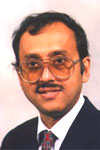
Professor Supriyo Bandyopadhyay, Virginia Commonwealth University, will be the speaker at the IEEE Richmond Section's Thursday, 4 January 2007 monthly meeting. The dinner meeting will start at 5:30 PM at the Hilton Garden Inn at Innsbrook. Reservations can be made at http://www.ieee.org/richmond/.
The workhorse of modern electronics is the celebrated “transistor” which serves as the building block of all digital and analog circuits. However, as transistor dimensions shrink, a host of complicating issues begins to emerge that detracts from the transistor’s performance. They can only be mitigated with mounting costs. It therefore behooves us to seek alternate paradigms for computing and signal processing that bypasses the transistor paradigm. In one example, the pixel intensities of a grey scale image are encoded in the voltage states of individual nanowires. The nanowires are then allowed to interact and the final steady state voltages are de-encoded into pixel intensities. The final pixel intensities represent edge enhancement detection. Thus, the array of nanowires can perform useful image processing functions. Many other such examples will be presented.
Dr. Supriyo Bandyopadhyay is a professor of electrical and computer engineering and a professor of physics at Virginia Commonwealth University. He directs the Quantum Device Laboratory engaged in research on nanostructured devices and systems. Prof. Bandyopadhyay is the current chair of the IEEE Nanotechnology Council Technical Committee on Spintronics and the IEEE Electron Device Society Technical Committee on Compound Semiconductor Devices and Circuits. He is also the Chair of the Regional Interest Group of the IEEE Nanotechnology Council and Vice President (Conferences) Elect of the Nanotechnology Council of the IEEE. He is profiled in numerous Who ’s Who and is a Fellow of the IEEE, American Physical Society, the Institute of Physics (UK),the Electrochemical Society and the American Association for the Advancement of Science.

No comments:
Post a Comment